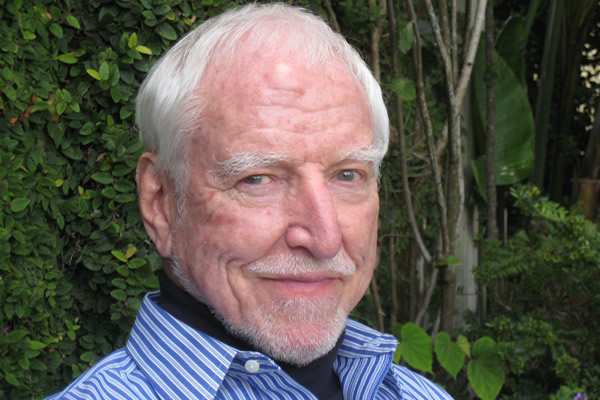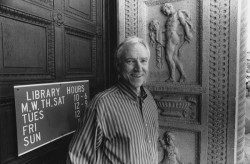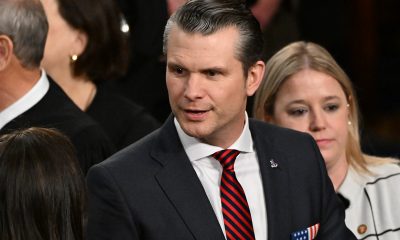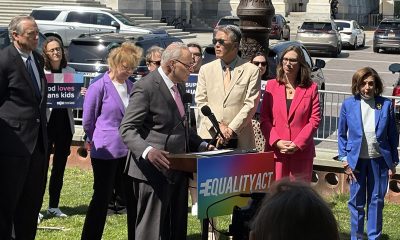Miscellaneous
‘Fit to Serve’
First openly gay U.S. ambassador recalls life in politics, activism in new memoir

When James Hormel decided to write his memoirs, he turned to an unlikely source for aid — his tennis partner.
Hormel, heir to the Geo. A. Hormel & Co. meatpacking business (famous for bringing SPAM to the world), had been interested for several years in sharing his compelling story of becoming the first openly gay U.S. ambassador when President Bill Clinton named him ambassador to Luxembourg in 1999 with a controversial recess appointment. Erin Martin, a former journalist whom Hormel knew from her work on the September 11th Fund, worked with him off and on for four years to bring the new book “Fit to Serve” (Skyhorse Publishing) to fruition.
“When I was actually serving in Luxembourg and after recognizing what it took to get there and how extremely receptive the country was and how welcoming, I thought there may be some material here that would be worth writing about,” Hormel says during a phone interview from New York where the long-time San Francisco resident is visiting on a book tour (he was in Washington this week for a signing). “I’d thought about it for several years and kind of realized I could go on thinking about it forever without actually doing anything, so Erin and I started.”
Hormel, now 78, has enjoyed a rather epic American life. Born into wealth, he writes evocatively of his Minnesota childhood and the sights, smells and sounds he shared with his two older brothers, Geordie and Thomas; his many years of trying to live the straight and narrow life with ex-wife Alice and their five children; his years of finding himself and settling in San Francisco in 1977; his work in Democratic politics and helping to start the Human Rights Campaign in the early ‘80s while many around him were dying of AIDS; and, of course, his work not only in Luxembourg but even more interestingly, the convoluted and bitterly fought battle he waged to get there, opposed at every turn by Republican senators and conservative groups like Family Research Council that painted him as a pedophile.
Influential colleagues are saying Hormel’s story is an important one.
“[It] reminds us that it wasn’t so long ago that being gay meant you could not serve in high government positions,” says Richard Socarides, the White House LGBT liaison in the Clinton administration. “With Bill Clinton’s help, Jim took on this fight for all of us and won.”
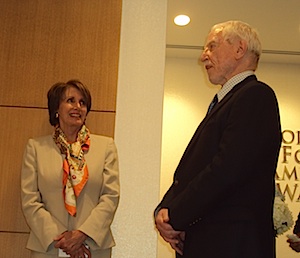
Former House Speaker Nancy Pelosi with Hormel at a book signing Thursday night in Washington. (Blade photo by Joey DiGuglielmo)
Longtime Hormel pal Nancy Pelosi, whom Hormel went out on a limb to support in her 1987 bid for Congress against gay candidate Harry Britt, is also raving about the book.
“Jim Hormel’s spirited story is a refreshing reminder of the power of the individual in America,” she said in a press release for the tome. “This book documents that a person driven by the courage of his or her convictions can still push the world to become a fairer, more equal place.”
Hormel says revisiting years gone by brought unexpected emotions, both good and bad.
“The burden I created for myself by the deception that occurred through the marriage and not being able to reveal sexual feelings outside of our relationship, that failure of communication, that was maybe the most painful for me to look at because I was totally responsible for it,” he says.
Though long on friendly terms with his ex-wife Alice, who has supported him for decades and read early drafts of the book, it was still a painful topic to revisit. He expects to see her next week for Thanksgiving.
“There were enormous feelings of guilt that came back to me in a wave,” he says.
Hormel also writes poignantly of his current relationship with Michael Nguyen, a dancer and musician he met in 2006 who’s five decades his junior. Hormel says they enjoy a bond he didn’t have with former partners Larry Soule and Tim Wu.
“[Michael] has given me an unconditional love that has been a discovery for me,” Hormel says. “It was new to me so this relationship has been special and unique.”
Hormel’s five now-adult children have welcomed Michael, he says, but mostly long distance. Only his son James lives near him in San Francisco.
Hormel met Clinton in March 1992 when the eventual president was campaigning. Hormel, long out by then and active in the Democratic Party in both California and nationally, had appreciated a reference Clinton made about the unacceptability of discrimination based on sexual orientation at a speech Hormel attended. He noticed something different in Clinton and was soon supporting him. Just before Clinton was elected that November, friends started floating the idea to Hormel that he should seek a presidential appointment.
“While [the] suggestion intrigued me, I didn’t take it all that seriously,” Hormel writes in the book. “It didn’t seem realistic: I had contributed, but I didn’t go to any great lengths to stump for Clinton. I couldn’t imagine that I was very high on the totem pole.”
Hormel considered the idea and eventually started actively pursuing it, but it was anger and disappointment, ironically, that lit a fire within him to pursue it full on. The still-controversial 1996 Defense of Marriage Act (DOMA), a Clinton-signed law that defined marriage as between a man and woman, was the fuel for Hormel’s effort.
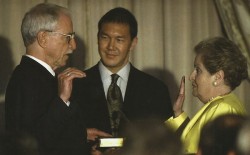
James Hormel, left, being sown in as U.S. Ambassador to Luxembourg by former Secretary of State Madeleine Albright in June 1999. Hormel’s former partner Tim Wu is with him. (Photo courtesy Skyhorse Publishing)
“While nothing short of repeal could make up for DOMA, I and others wanted a clear sign that Clinton had not abandoned our constituency,” Hormel writes. “My anger propelled me into a non-stop, night-and-day effort to secure an ambassadorial nomination. Short of cheating and stealing, I was going to do whatever it took. Nothing was more important to me in that moment.”
Hormel is slightly more understanding in hindsight. He says it’s important to consider the context of when DOMA and “Don’t Ask, Don’t Tell” were enacted but neither does he fully buy Hillary Clinton’s 2008 assertions that DOMA was the lesser evil compared to a proposed constitutional amendment.
“It’s hard to take it all out of the context of 1996 or with ‘Don’t Ask, Don’t Tell,’ out of 1993,” Hormel says. “With DOMA, the president was in a reelection campaign. There were three candidates. We forget that Clinton was never elected by a majority and you know the political climate was very negative at the time. The Republicans had experienced two years of running both the Senate and the House and they hadn’t done that in 40 years. They were out to get Clinton no matter what so it was probably a defensive aspect of his with DOMA. I think it’s one of the worst pieces of legislation that I’m aware of. It’s blatantly unconstitutional. There are so many bad things about it.”
Hormel faced opponents on two main fronts — late former Sen. Jesse Helms, a notoriously anti-gay politician Hormel calls a “hatemonger” who was chair of the Senate Committee on Foreign Relations who stood between Hormel and the post he wanted, and an avalanche of misconstrued press from the Traditional Values Coalition, an organization that had sent a rep to the James C. Hormel Gay & Lesbian Center at the San Francisco Public Library and copied controversial material housed there for archival purposes that the Coalition said Hormel espoused.
Hormel, dejected when a 1999 “700 Club” segment about his status as an ambassadorial nominee and supposed pedophile aired, found unexpected inspiration from memories of his father and grandfather, larger-than-life figures who’d played huge roles in shaping and inspiring him.
“I felt nauseous,” Hormel writes of seeing the “700 Club” segment. “Partly from my disgust over the willful fabrication, partly out of fear that the televangelist [Pat Robertson] had succeeded in taking away from me what, by then, I most desired.”
A photo of his father, Jay Hormel, who died in 1954, gave him inspiration.
“He seemed to look right back at me, chiding, ‘Jimmy, why are you letting them get to you,’” Hormel writes.
He says any opinions of what his father and grandfather would think of his accomplishments today are “very speculative” but he’s hopeful their progressive-for-their-eras attitudes and business practices, covered at length in the book, provide clues.
“I think they would be supportive,” Hormel says. “They spoke of kindness and of caring and wanting to make things better for other people and they did things in their lifetimes that reflected that. My father’s crowning business achievement was to create a program of guaranteed annual wages and a profit sharing plan that he put in place in the depths of the Depression and it kept a lot of people working in the community.”
And though his brief period of service in Luxembourg — much less intense than the path that led to it — is long over, Hormel has stayed active in politics and has a few thoughts on current gay issues.
Of Obama, Hormel says, “By and large, he has a wonderful record for us and has done more than every other president put together and we’re edging toward the time when we’ll have an actual member of the Cabinet who’s gay. Who could have dreamed of that a few years ago? On the other hand, he’s taken a position on DOMA that is very confusing. It confuses me and it confuses a lot of people and he really doesn’t seem to want to take the step of saying, ‘This is wrong,’ and I feel that’s unfortunate because this law is so blatantly wrong.”
Hormel says HRC has changed dramatically since its early years and says part of the criticism often directed at it is inevitable because of the work it does.
“When you have an organization that is dominating and addressing these kinds of issues, you’re never going to please everyone,” he says. “Also people by and large don’t understand what it’s like to make laws. They say there are two things you should never see being made — laws and sausage, because it’s a messy process and people outside the process don’t fully understand what it takes to get things accomplished. That’s a PR problem that HRC faces. I think they’ve done an admiral job and as they’ve continued to grow, I think they are continually getting better focused. On the other hand, when one is based in Washington and encompassed every day in Washington surroundings, which today are so horrendous, I think one tends to become a little jaded and perhaps less in touch with broad constituencies. I think that happens to member of Congress. They lose touch and it happens for other organizations as well.”
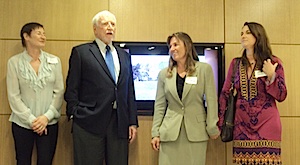
Jim Hormel with his three daughters at a book signing event at People for the American Way Thursday night in Washington. (Blade photo by Joey DiGuglielmo)
Hormel closes the book with a poignant chapter on the inspiration for his political work, which he says is rooted in having summoned the courage in the ‘60s to come out. It helped form his altruistic and activist tendencies.
“My progress on this earth was stymied until the time in my life when I chose to follow my heartfelt instincts and desires and live openly as a gay man,” he writes. “I had to clear away truckloads of psychic garbage in order to free the real me from a self-imposed prison. Only then was I able to see that my genuine interest was in finding a way to help build a better world.”
Miscellaneous
Stephen Miller’s legal group sues Fairfax County schools
Lawsuit challenges policies for transgender, nonbinary students

Former Trump administration official Stephen Miller’s legal group on Tuesday filed a lawsuit against the Fairfax County School District over its policies for transgender and nonbinary students.
America First Legal in a press release notes it filed the lawsuit against the school district on behalf of a female, “practicing Roman Catholic” student “for allowing teenage boys to use the female restrooms and for forcing a radical, government-sponsored gender indoctrination and approved-speech scheme that discriminates against students on the basis of sex and religion and violates their free speech rights under the Virginia Constitution.”
The lawsuit was filed in Fairfax County Circuit Court.
The Virginia Department of Education last July announced new guidelines for trans and nonbinary students for which Republican Gov. Glenn Youngkin asked. Equality Virginia and other advocacy groups claim they, among other things, would forcibly out trans and nonbinary students.
Fairfax County schools are among the school districts that have refused to implement the guidelines.
“Fairfax County Public Schools appears to believe that its policies and regulations can override the Virginia Constitution’s protections for religious beliefs, speech and from government discrimination on the basis of sex and religious beliefs,” said America First legal Senior Advisor Ian Prior in a press release. “It is well past time for FCPS to stop sacrificing the constitutional rights of its students so that it can implement a state-sanctioned ideology that demands compliance in speech, beliefs and conduct.”
FCPS Pride, a group that represents the Fairfax County School District’s LGBTQ employees, described the lawsuit as “abhorrent.”
“We are confident that the school board and the superintendent will strongly and firmly oppose this specious suit and continue to support all students, including transgender and gender expansive students,” said the group in a press list.
Miscellaneous
More than a dozen LGBTQ candidates on the ballot in Va.
Control of the state Senate hangs in the balance
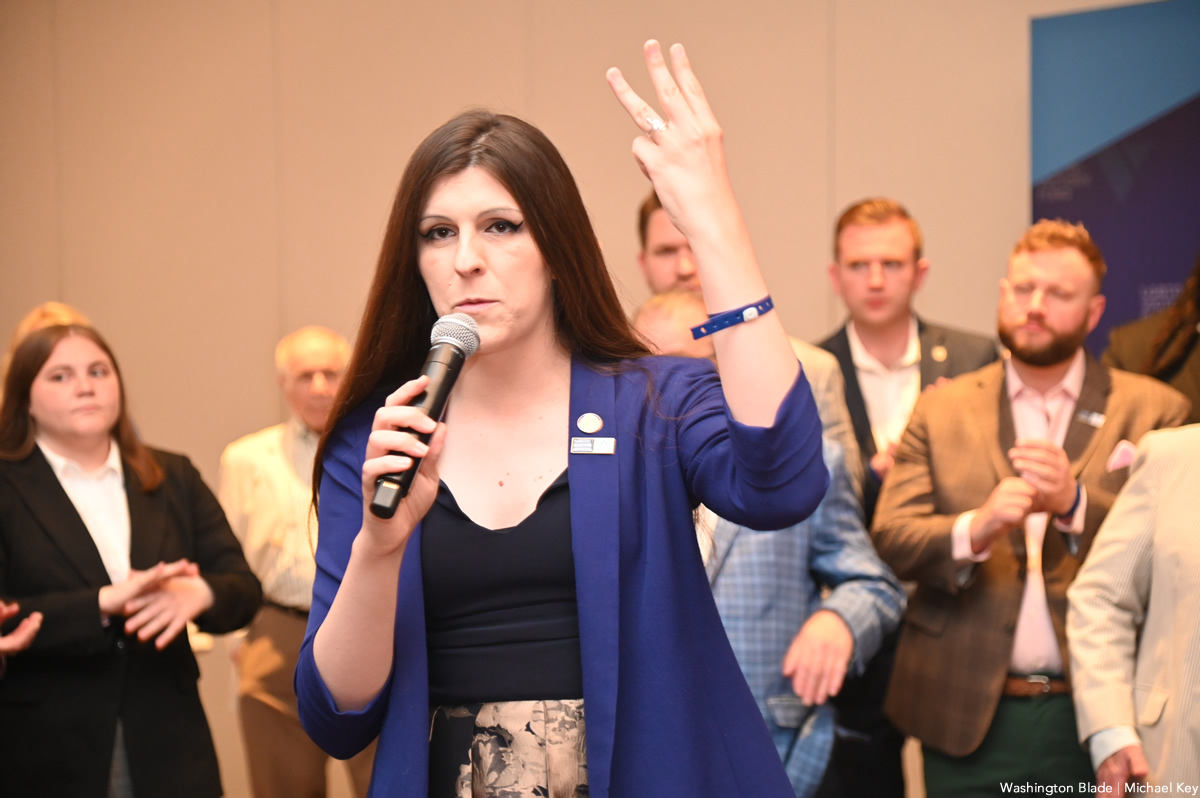
More than a dozen openly LGBTQ candidates are on the ballot in Virginia on Nov. 7.
State Del. Danica Roem (D-Manassas) is running against Republican Bill Woolf in the newly redistricted Senate District 30 that includes western Prince William County and the cities of Manassas and Manassas Park.
Roem in 2018 became the first openly transgender person seated in a state legislature in the U.S. after she defeated then-state Del. Bob Marshall, a prominent LGBTQ rights opponent who co-wrote Virginia’s constitutional amendment defining marriage as between a man and a woman. Roem would become Virginia’s first out trans state senator if she defeats Woolf.
Woolf supports a bill that would require school personnel to out trans students to their parents. The Republican Party of Virginia has highlighted this position in ads in support of Woolf.
“Thank you for reminding me why I won three elections in this district in Prince William County, which is the most diverse county in all of Virginia and the 10th most nationally where we welcome everyone because of who they are, not despite it, no matter what you look like, where you come from, how you worship, if you do, or who you love because you should be able to thrive here because of who you are, never despite it,” said Roem on Sept. 28 in response to a woman who heckled her during a debate with Woolf that took place at Metz Middle School in Manassas.
Gay state Sen. Adam Ebbin (D-Alexandria) is running for re-election in Senate District 39. State Del. Mark Sickles (D-Fairfax County), who is also gay, is running for re-election in House District 43.
Former state Del. Joshua Cole, who identifies as bisexual, is running against Republican Lee Peters in House District 65. State Del. Kelly Convirs-Fowler (D-Virginia Beach), who came out as bisexual last year at Hampton Roads Pride, will face Republican Mike Karslake and independent Nicholas Olenik.
State Del. Marcia “Cia” Price (D-Newport News), a Black woman who identifies as pansexual, is running for re-election in House District 85.
Adele McClure, a queer Democrat, is running to represent House District 2 that includes portions of Arlington County. Laura Jane Cohen, a bisexual woman who is a member of the Fairfax County School Board, is a House of Delegates candidate in House District 15.
Rozia Henson, a gay federal contractor who works for the Department of Homeland Security, is running in House District 19. Zach Coltrain, a gay Gen Zer, is running against state Del. Barry Knight (R-Virginia Beach) in House District 98.
LPAC has endorsed Jade Harris, a Rockbridge County Democrat who is running to represent Senate District 3. Harris’ website notes trans rights are part of their platform.
“Protecting trans rights, repealing right to work, strengthening unions and supporting our farmers are just a few of my legislative priorities,” reads the website. “I am dedicated to addressing the revitalization of our state’s infrastructure, fostering a favorable environment for job creation, and supporting our public education system.”
Republicans currently control the House by a 51-46 margin, while Democrats have a 21-19 majority in the state Senate.
Senate Democrats have successfully blocked anti-LGBTQ bills that Republicans have introduced since Republican Gov. Glenn Youngkin took office in January 2022.
The Virginia Department of Education in July released new guidelines for trans and nonbinary students that activists and their supporters have sharply criticized. They fear that Republicans will curtail LGBTQ rights in the state if they regain control of both houses of the General Assembly on Nov. 7.
“Time and time again, anti-equality lawmakers and the Youngkin administration have made it clear that they will continue to disrespect and disregard the lives and lived experience of LGBTQ+ people within Virginia,” said Equality Virginia PAC Executive Director Narissa Rahaman in August when her organization and the Human Rights Campaign endorsed Roem, Ebbin and other “pro-equality champions.”
“We must elect pro-equality champions who will secure and strengthen our freedoms,” added Rahaman. “We have that chance as the eyes of the nation are on us this November.”
The LGBTQ+ Victory Fund has endorsed Fairfax County School Board Vice Chair Karl Frisch and Fairfax County School Board candidates Robyn Lady and Kyle McDaniel, who identify as lesbian and bisexual respectively.
Michael Pruitt would become the first openly bisexual man elected to the Albemarle County Board of Supervisors if he were to win on Nov. 7. Blacksburg Town Councilman Michael Sutphin and Big Stone Gay Town Councilman Tyler Hughes, who are both gay, are running for re-election.
“Tyler will be a critical voice for equality as the only out LGBTQ+ person on the Big Stone Gap Town Council,” says the Victory Fund on its website.
Cal Benn contributed to this article.
Miscellaneous
What it means to be an active ally to your LGBTQ+ co-workers TEST
Five easy tips to help you avoid common risks
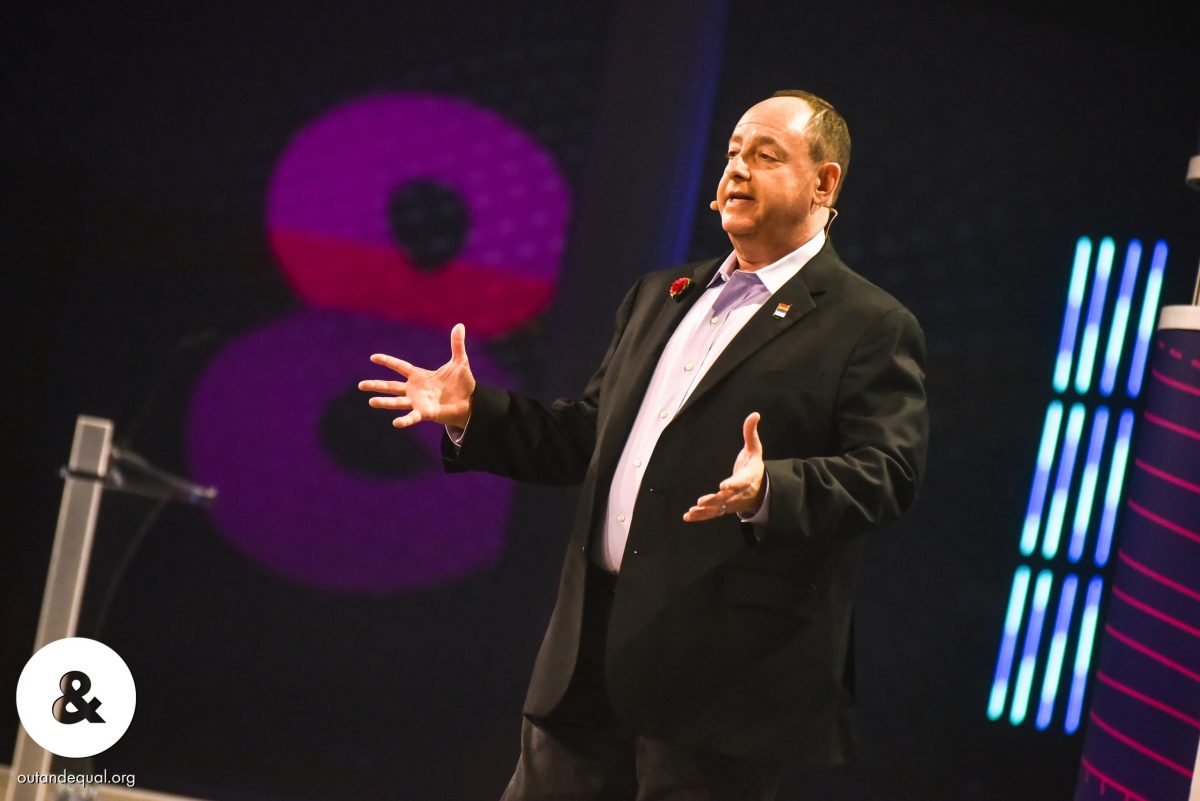
Your home is more than just a place to eat and sleep; it’s your safe haven. As much as you might cherish your home, you should probably also recognize the potential hazards within its familiar walls. Accidents can happen in an instant, yet with a little foresight and some simple adjustments, you can transform your house into a safer haven.
Accidents can happen anywhere, and with a few simple tweaks, you can lower risks in your space. Below you’ll find five tips for each room in your home to help prevent injuries, falls, and other mishaps. In short, home safety.
This article was inspired by a shower in a rental we managed that began leaking through the kitchen ceiling below. If only the landlord had installed grab bars, right!? Below, we’ll guide you through the steps to fortify your bathroom, making it a place of relaxation without the fear of slips and falls. Then, we’ll venture into the room where the magic happens, where proper planning can ensure great nights and peaceful mornings. We’ll show you how to prevent accidents while you experiment becoming the next Gordon Ramsey. And we’ll include a few surprising solutions for those other rooms that hold their own unique hazards, offering solutions to safeguard against unexpected mishaps.
Bathroom Safety
Install Grab Bars: Adding grab bars near the shower and toilet can provide essential support for family members of all ages. Not only can they help with getting in and out, but they can help provide stability when washing. Make sure they are securely anchored to the wall.
Non-Slip Mats: Place non-slip mats inside the shower and bathtub to prevent slips. They’re a small investment that can save you from falls and head injuries.
Adjust Water Temperature: Ensure your hot water is set to a safe temperature to avoid scalding. The hot water heater should be set to around 120°F (49°C)l, the middle setting on many water heater settings.
Medicine Cabinet Locks: If you have young children, use childproof locks on your medicine cabinet to keep harmful substances out of reach.
Proper Lighting: Ensure there’s adequate lighting in the bathroom to avoid trips and falls during nighttime visits. Nightlights can be a simple and effective solution.
Bedroom Safety
Clear Pathways: Keep pathways in the bedroom clutter free to prevent tripping. Ensure there’s enough space to move around comfortably, particularly getting around the bed. Be aware where all furniture is when walking around to avoid stubbed toes, particularly at night.
Secure Rugs: If you have throw rugs, use rug grippers or double-sided tape to keep them from slipping. Loose rugs are a common trip hazard.
Bed Rails: For anyone at risk of falling out of bed, consider installing bed rails to provide extra support and prevent falls.
Nightstands with Drawers: Opt for nightstands with drawers to keep essential items. This reduces the need to get out of bed at night, minimizing the risk of falls, as you race to grab what you need and not lose a moment’s rest.
Fire Safety: Install battery-operated smoke detectors in the bedrooms if there are none. Make sure to install them 36 inches away from an air vent or the edge of a ceiling fan. Also six inches away from the joint between the wall and ceiling. And test smoke detectors regularly.
Kitchen Safety
Non-Slip Flooring: Choose slip-resistant rugs in the kitchen, especially in areas where spills are common. Mats near the sink and stove can also help and you can often buy them fairly cheaply at Costco.
Childproof Cabinets: If you have little ones, use childproof latches on cabinets and drawers to prevent them from accessing potentially hazardous items.
Anti-tip brackets: Install an anti-tip bracket behind the range. These are often used when children are in the home. Although they are less likely to open the oven door and use it as a step stool to get to the stove-top, adults can also benefit from installing these.
Adequate Lighting: Proper lighting is crucial in the kitchen to avoid accidents. Under-cabinet lighting can illuminate work areas effectively.
Secure Heavy Items: Ensure heavy pots and pans are stored at waist level to prevent straining or dropping them from high shelves.
Sharp Object Storage: Keep knives and other sharp objects in a secure drawer or block. And handle all sharp items with extreme care, even when washing and drying. These steps reduce the risk of accidental cuts.
Other Safety Tips
Furniture Anchors: Secure heavy furniture, like bookshelves and dressers, to the wall to prevent tip-overs, especially if you have young children.
Adequate Outlets: Check for damaged outlets and replace them promptly. Avoid overloading circuits with too many devices. Install placeholder plugs in outlets to prevent young curious fingers (or tongues?) from going inside an electrical outlet.
Stair Gates: If your home has stairs, install safety gates at the top and bottom to prevent falls, especially if you have toddlers or pets to keep them off of the stairs when you cannot monitor them.
Emergency Escape Plan: Develop and practice an emergency escape plan with your family, including a designated meeting place outside.
Carbon Monoxide Detector: If your home burns any fossil fuels for heating or appliances, install carbon monoxide detectors in common areas of your home to detect this odorless gas. The D.C. building codes require this if you use a fireplace or if you have an attached garage. In essence, if there is any potential source of carbon monoxide in the home, be sure to install these detectors.
Remember, a safer home not only prevents accidents but also provides peace of mind for you and your family. Implement these simple tips to create a secure environment in every room of your house.
With these practical tips and a few adjustments, you can significantly reduce the risk of injuries and falls in your home. Enjoy peace of mind in your now much safer haven.
Scott Bloom is owner and senior property manager of Columbia Property Management.
-

 U.S. Supreme Court5 days ago
U.S. Supreme Court5 days agoSupreme Court upholds ACA rule that makes PrEP, other preventative care free
-

 District of Columbia5 days ago
District of Columbia5 days agoActivists protest outside Hungarian Embassy in DC
-

 Virginia4 days ago
Virginia4 days agoSpanberger touts equality, reproductive rights in Arlington
-

 Books4 days ago
Books4 days agoTwo new books on dining out LGBTQ-style

